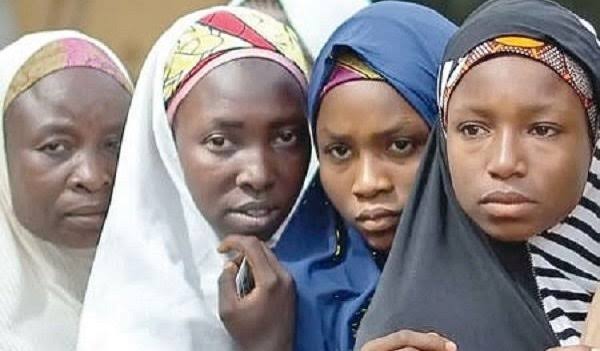The Hijab Controversy: Why Schools Should Be Secular

By Ezinwanne Onwuka
The banning of religious clothing and symbols in public schools is an ongoing and contentious issue in education, that has generated a great deal of national controversy.
The Islamic headscarf, referred to as hijab, is one such item that is considered overt and by which the wearer’s religious affiliation is immediately identifiable and it is the banning of Islamic headscarves that has been at the centre of this controversy.
The agitation for or against the wearing of hijab has been on ground for some years now but this old wound was lately reopened when the news of the authorities of some mission schools in Kwara State prohibited female Muslim students from entering the school premises on account of their hijabs hit the mass media. Lagos, Osun, Oyo and Ibadan are some of the states that have been struck by this Islamophobia over the years.
It is no gainsaying that as the number of female Muslim students in public schools has increased, so have challenges to their rights to religious expression. And this is largely because we are experts in focusing on the wrong things.
The educational sector in the country is beset with a myraid of problems, some of which are poor fundings, poor teaching/learning facilities among others. Yet, we are concerned about a trivial matter like how one chooses to dress in obedience to one’s religious injunction. Surely, there are much more urgent issues bedeviling our educational system that persistently begs for our attention than the wearing of a headscarf.
A good example is the argument by the Christian Association of Nigeria, Kwara State’s chapter for the ban of hijab. According to the body, in a period when schools are being invaded with female students carted away, hijab in mission schools could lead to a situation in which Christian students become easy prey. Ridiculous, isn’t it? If they truly care about the education of their children, the real concern should be about the safety and security of students, at a period schools are under serious threats, not whether or not they wear hijab.
Moreover, schools are supposed to be inclusive spaces for learning; the acquisition of knowledge. Allowing female Muslim students to wear hijab is not prejudicial to public interest, does not affect learning in any way and is not a threat to the acquisition of knowledge.
No doubt, the controversy over the use of Hijab by female Muslim students in ‘mission’ schools reveals the way religion is being used to divide and cause chaos in the country. Any form of victimization, harassment, punishment and denial of entrance into the school premises or classrooms on female Muslim students for wearing hijab amounts to either denying the girls access to basic education or change their religion.
Generally, in the context of school policies, rules that favour one group over another or where a rule has less favourable impact on one group may be construed as discriminatory. Thus, a school that prohibits female Muslim students from wearing hijabs, while allowing a Catholic student to wear a crucifix necklace, and a school that banned the teaching of Christian Religious Knowledge and concentrates only on Islamic Studies (vice versa) acts discriminately.
To reiterate, schools are places of learning. Against this backdrop, they (schools) should maintain absolute religious neutrality. Hence, schools must be secular and not promote any particular religious practice or group/sect – a non-sectarian and secular education. This is because religion is, primarily, a private matter; a matter, exclusively, for parents and the church/mosque.
For this reason, I am vehemently opposed to ‘mission’ schools. No doubt, religious leaders (Christians and Muslims alike) may build a school so as to contribute to national development. And the school built, if they really understand the meaning of a school, should cater for the mental development, and not the spiritual needs, of a child. Building a school in order to instil your religious beliefs on children and/or impose your beliefs on others of different faith is misguided.
In a society, like ours, in which several religions coexist within one and the same population, it is necessary to uphold secularism and maintain religious neutrality in our educational institutions, so as to protect the rights and freedoms of others, and recognise, as well as appreciate, our religious diversity.
However, this does not mean that religious instruction and activities in government schools should be entirely barred. Schools may offer religious instruction and allow religious activities provided they do not amount to proselytising, and they do not promote any particular religious practice, denomination or sect. In other words, schools should respect the religious background and beliefs of all students by not promoting any particular set of beliefs in preference to another.
In the context of education, it is generally unlawful for education providers to discriminate against a person on the ground of the person’s religious beliefs and convictions by refusing or failing to accept the person’s application for admission as a student; or in the terms or conditions on which it is prepared to admit the person as a student. It is also unlawful for an educational authority to discriminate against a student on the ground of the student’s religious convictions by denying the student access, or limiting the student’s access, to any benefit provided by the school authority; or by expelling the student or subjecting the student to any other detriment.
In order to unite in our diversity, all stakeholders in the educational sector need to respect and tolerate each other’s differences. It is important to create equality in our schools by respecting every individual’s right to human dignity. Difficulties and controversies will definitely arise if schools promote or accommodate the rights and expectations of one group at the expense of another. Children who are eager to learn in culturally diverse public schools across the country should not find themselves in a cul-de-sac.


